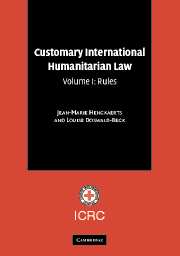Book contents
- Frontmatter
- Contents
- Foreword by ICRC President Jakob Kellenberger
- Foreword by Judge Abdul G. Koroma
- Foreword by Yves Sandoz
- Acknowledgements
- Introduction
- List of abbreviations
- Part I The Principle of Distinction
- Part II Specifically Protected Persons and Objects
- Part III Specific Methods of Warfare
- Part IV Weapons
- Chapter 20 General Principles on the Use of Weapons (Rules 70–71)
- Chapter 21 Poison (Rule 72)
- Chapter 22 Nuclear Weapons
- Chapter 23 Biological Weapons (Rule 73)
- Chapter 24 Chemical Weapons (Rules 74–76)
- Chapter 25 Expanding Bullets (Rule 77)
- Chapter 26 Exploding Bullets (Rule 78)
- Chapter 27 Weapons Primarily Injuring by Non-detectable Fragments (Rule 79)
- Chapter 28 Booby-traps (Rule 80)
- Chapter 29 Landmines (Rules 81–83)
- Chapter 30 Incendiary Weapons (Rules 84–85)
- Chapter 31 Blinding Laser Weapons (Rule 86)
- Part V Treatment of Civilians and Persons Hors De Combat
- Part VI Implementation
Chapter 23 - Biological Weapons (Rule 73)
Published online by Cambridge University Press: 05 June 2012
- Frontmatter
- Contents
- Foreword by ICRC President Jakob Kellenberger
- Foreword by Judge Abdul G. Koroma
- Foreword by Yves Sandoz
- Acknowledgements
- Introduction
- List of abbreviations
- Part I The Principle of Distinction
- Part II Specifically Protected Persons and Objects
- Part III Specific Methods of Warfare
- Part IV Weapons
- Chapter 20 General Principles on the Use of Weapons (Rules 70–71)
- Chapter 21 Poison (Rule 72)
- Chapter 22 Nuclear Weapons
- Chapter 23 Biological Weapons (Rule 73)
- Chapter 24 Chemical Weapons (Rules 74–76)
- Chapter 25 Expanding Bullets (Rule 77)
- Chapter 26 Exploding Bullets (Rule 78)
- Chapter 27 Weapons Primarily Injuring by Non-detectable Fragments (Rule 79)
- Chapter 28 Booby-traps (Rule 80)
- Chapter 29 Landmines (Rules 81–83)
- Chapter 30 Incendiary Weapons (Rules 84–85)
- Chapter 31 Blinding Laser Weapons (Rule 86)
- Part V Treatment of Civilians and Persons Hors De Combat
- Part VI Implementation
Summary
Rule 73. The use of biological weapons is prohibited.
Practice
Volume II, Chapter 23.
Summary
State practice establishes this rule as a norm of customary international law applicable in both international and non-international armed conflicts. This rule applies to biological weapons that are meant to affect humans. Whether it is intended to apply to herbicides is discussed under Rule 76.
International and non-international armed conflicts
The prohibition of the use of biological weapons in international armed conflicts is based on the Geneva Gas Protocol and the Biological Weapons Convention. When they became party to the Geneva Gas Protocol, 37 States entered a reservation to the effect that they retained the right to retaliate if an adverse party (and in some cases that party's ally) violated the terms of the Protocol. Because 17 of these “no first use” reservations have been withdrawn, only 20 such reservations remain. However, 18 of the remaining 20 States that have kept their reservations are party to the Biological Weapons Convention, which prohibits any possession of biological weapons, thereby making it unlawful for them to retaliate using such weapons. Thus, at present, Angola and Israel are the only States that have maintained their “no first use” reservation to the Geneva Gas Protocol and are not party to the Biological Weapons Convention.
It can be concluded from the drive to eliminate biological weapons over the last three decades that States believe that these weapons should not exist and therefore must not be used in any circumstances, including in non-international armed conflicts.
- Type
- Chapter
- Information
- Customary International Humanitarian Law , pp. 256 - 258Publisher: Cambridge University PressPrint publication year: 2005
- 1
- Cited by



